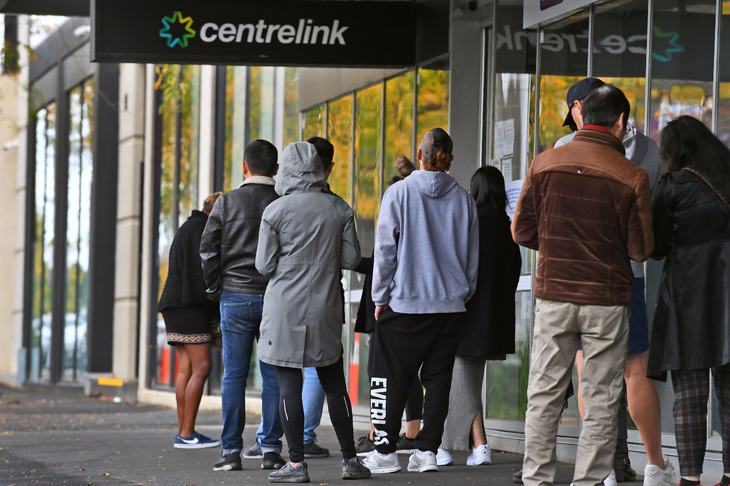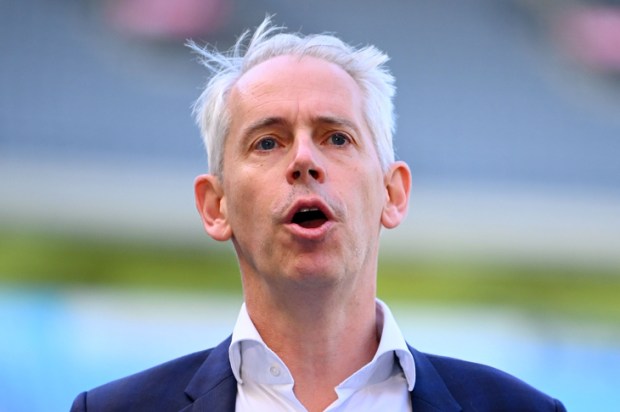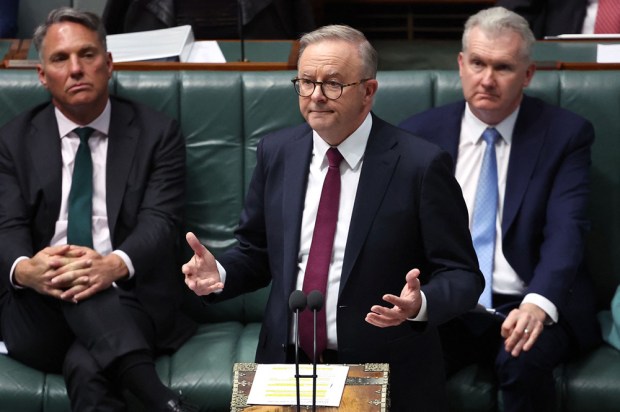Is it impossible for government today to do anything without wasting and even misappropriating vast amounts of the taxpayers’ hard-earned money? The result is government itself is the major reason for our increasing cost of living. Add to that the fact that too many things are being done which, either by law or custom, are beyond the proper remit of the particular government, from undermining the national day or the flag, the use of gas in kitchens, or replacing a cheap and reliable electricity grid with one which is expensive and unreliable.
When years ago a Sydney eastern suburbs council considered a motion declaring itself ‘nuclear-free’, like any competent public company board chairman faced with a motion supporting the Voice, a sensible mayor would have ruled it beyond power.
But not content with passing the motion, the council added ratepayer-funded signage. But as no one was proposing a nuclear reactor on Bondi Beach, why was it necessary to pay to confront pedestrians and motorists with ‘nuclear-free’ signs? This was no more than an early example of politicians’ virtue-signalling.
Years later, I witnessed a gross abuse of power by Sydney’s Town Hall. This was about the referendum for a politicians’ republic, hardly a matter within the city council remit.
It was not so much that on the night of the vote, they refused to allow Australians for Constitutional Monarchy to rent a vacant hall, something done from ACM’s inception. It was that for weeks before the vote, Sydney’s streets were festooned with custom-designed Vote Yes banners.
A long-standing example of federal government waste came into the news recently. This was when opposition leader Peter Dutton proposed an incentive to wean people off unemployment benefits. Introduced a half-century ago by the Whitlam government, these must be among the most wasteful in the world.
In an advanced society, contributary employment insurance should be available to protect those who lose their jobs, especially during economic downturns, until they can reasonably find another. Unemployed school leavers are a different category. Their situation is best answered by something like the optional quasi-military programme suggested by Warwick Stacey on ADH TV.
Every politician must realise that the current Australian system exists primarily to make work optional for the healthy and able. Although beneficiaries are assumed not to be Coalition-voters, Coalition governments have usually gone no further than proposing minimally effective ‘work for the dole’ schemes. Funded by the hard-working taxpayers of this country, the ‘success’ of this system has encouraged even more ill-designed programmes, such as the NDIS. These are growing so large that soon, welfare dependency will eventually swallow up much of the federal budget.
Dutton’s proposal was that instead of increasing the dole substantially beyond indexation, the unemployed should be allowed to earn up to $300 a fortnight without losing the dole, no doubt as an incentive to acquire a taste of work. The Albanese government was not interested, arguing that it would only increase the number of people on the dole.
It has been common knowledge for some time that it is difficult to find workers and conversely, easy to find a job.
Yet, at the end of June, those on Job Seeker and Youth Allowance totalled 881,960.
With a little flexibility, as was once normal, there were sufficient jobs to go around.
Added to that, there is an extraordinary number in long-term unemployment.
When employers are on their knees pleading for workers, we have over 73,000 who have been unemployed for between one and two years.
There is worse, far worse.
Close to a quarter of a million have been unemployed for between two to five years, over 150,000 for between five to ten years with a similar number unemployed for over a decade. And they have all just been given an increase. An incentive to continue?
The politicians might as well throw the taxpayers’ money into the ocean.
The solution is simple. The dole should be replaced by a normally closed-benefit, contributory insurance scheme. Under the present scheme, the politicians act as tempters to the able and healthy to become welfare-dependent and to treat work as an option. Not only do they corrupt the beneficiaries, but they are also corrupting themselves, presumably buying votes in return for this corruption and unfairly burdening hard-working taxpayers.
Those who give up work have time on their hands to engage in idleness and worse. The politicians only encourage this. Democracy not only depends on a fine constitution and the rule of law, but it also depends on an essentially virtuous hard-working community, the governed as well as the governors.
We once had such a virtuous society and consequently, achieved much. Our political class is doing their best to undermine this.
There is, sadly, even worse.
The answer to racial division is assimilation, as Sir Paul Hasluck and Sir Robert Menzies endeavoured to ensure for the Aboriginal people. Assimilation means that all Australians, of all races, should have exactly the same rights and obligations.
Abandoning assimilation for separate development in the remote communities and basing it on welfare dependency, disparaged by the recipients as ‘sit-down money’, has had the effect of keeping those communities not in some past culture but in a startlingly high level of degradation and abuse which would be a disgrace to any country, even more so this advanced country. In an interview with Alan Jones on ADH TV, the 25th prime minister, John Howard, recalled the horrifying levels of, and spread of, child abuse in the remote communities detailed in the Little Children are Sacred report, abuse which courageously led him to federal intervention.
That scourge of infantile, as well as women’s abuse, has since shamefully returned.
Neither the answer to abuse nor to closing the gap, the Voice has the clear potential to make this country ungovernable and to hand over its wealth to a class of rentiers, just as the recent West Australian legislation is doing. Parliament can repeal that, which seems likely. That’s something they can’t do to a body installed in the consitution by a successful referendum, even if it is the disaster it will surely be.
Got something to add? Join the discussion and comment below.
Get 10 issues for just $10
Subscribe to The Spectator Australia today for the next 10 magazine issues, plus full online access, for just $10.
You might disagree with half of it, but you’ll enjoy reading all of it. Try your first month for free, then just $2 a week for the remainder of your first year.














Comments
Don't miss out
Join the conversation with other Spectator Australia readers. Subscribe to leave a comment.
SUBSCRIBEAlready a subscriber? Log in